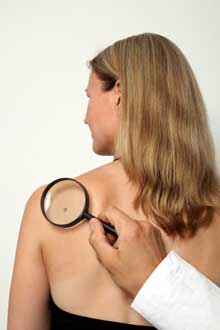What You Don’t Know About Skin Tags May Change
Your Opinion About Your Health!
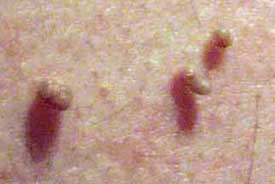
Every medical condition, be it a cold or a fatal disease, comes with a set of symptoms that doctors use to determine the illness. Some conditions have clearly grouped symptoms that doctors can use to diagnose their patients; others, like Polycystic Ovarian Syndrome (PCOS) do not. Loosely defined by a group of symptoms that women with this illness experience in varying combinations, Polycystic Ovarian Syndrome (PCOS) is a fairly common health problem that physicians know relatively little about.
One thing health-care professionals do know for certain is that Polycystic Ovarian Syndrome (PCOS) is often accompanied by a variety of adverse skin conditions, including acne, acanthosis nigricans, and skin tags. How these conditions are connected to the disease is up for debate, but the fact that Polycystic Ovarian Syndrome (PCOS) is a serious health concern is not something that doctors would argue against.
+ Click here to learn about the all natural PCOS 5-Element Solution
+ Click here to read more articles about PCOS and Skin Disorders
Causes
PCOS: Why Does PCOS Occur?
Polycystic Ovarian Syndrome (PCOS) is an endocrine disorder that can occur when women’s bodies produce unusually high levels of androgens, or male hormones. Although some women are surprised to learn they have testosterone in their bodies, the term “male” hormone is actually a bit of a misnomer. You see, every person, both male and female, has the sex hormones testosterone, estrogen, and progesterone. Because men have higher levels of testosterone than women, it has become known as a male hormone—likewise with estrogen and progesterone in females. The difference between the sexes, then, lies in both their physical anatomy and the hormone levels that regulate their reproductive systems.
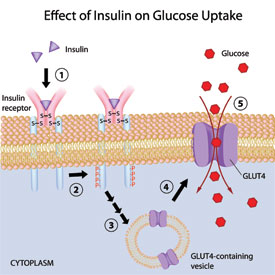
The next logical question is why? Why do some women have higher levels of male hormones? Well, it often boils down to an underlying condition called Insulin Resistance, Insulin Resistance is a condition that prevents the body’s cells from allowing insulin to bind to the cell, therefore not allowing glucose to enter the cell to be converted into energy. Insulin Resistance is a condition that can lead to a variety of other, more serious, conditions, including diabetes, Metabolic Syndrome, pre-diabetes, obesity, heart disease, and Polycystic Ovarian Syndrome (PCOS).
The endocrine system is very delicate, and, as is evident by how many different disorders Insulin Resistance can cause, can lead to serious health conditions when its hormone levels are knocked out of balance.
Symptoms
What Should You Look For with PCOS?
Although the exact triggers of Polycystic Ovarian Syndrome (PCOS) and its symptoms are not fully understood in their entirety by today’s medical community, doctors are well aware of the long list of emotional and physical symptoms that PCOS can present with. These symptoms include:
 Infertility:? Affecting approximately 5-10 percent of women of childbearing age, Polycystic Ovarian Syndrome (PCOS) is a leading cause of female infertility and has deprived millions of women of the opportunity to conceive, carry, and deliver their own children.
Infertility:? Affecting approximately 5-10 percent of women of childbearing age, Polycystic Ovarian Syndrome (PCOS) is a leading cause of female infertility and has deprived millions of women of the opportunity to conceive, carry, and deliver their own children.- Ovarian Cysts:? Polycystic ovaries have given this condition its name, and they are common in many women who suffer through the rest of the symptoms of PCOS. Surprisingly, though, cysts are not required for a solid diagnosis, as women often experience unique combinations of symptoms.
- Irregular Periods:? Because the body cannot maintain its reproductive functions without the proper levels of hormones, women who have Polycystic Ovarian Syndrome (PCOS) can experience infrequent, sporadic, or even altogether missing menstrual periods.
- Anovulation:? The release of an egg from the ovary is crucial in achieving conception, without an egg there will be no baby. It is obvious, then, how a lack of ovulation in women who have Polycystic Ovarian Syndrome (PCOS) can upset the regular reproductive cycle and cause infertility.
- Weight Gain or Obesity:? One of the hallmarks of Polycystic Ovarian Syndrome (PCOS), weight gain is a serious symptom because it both indicates an underlying health problem and intensifies it. Although weight gain is very common in women who have PCOS, some of the women who are diagnosed are not overweight. A very visible and difficult to deal with symptom, weight gain is one of the most emotionally difficult side effects of PCOS to handle.
- Skin Conditions:? Acne, skin tags, and acanthosis nigricans are common to women who have PCOS. Although they may not be dangerous in their own right, they indicate deeper issues. Additionally, acne can be physically painful and all of these conditions can cause a drop in self-esteem.
- Elevated Blood Pressure and Cholesterol:? Women who have Polycystic Ovarian Syndrome (PCOS) are already at an increased risk of developing heart disease. For this reason, these symptoms are especially serious and should be monitored closely as they can easily lead to cardiovascular health issues.
- Sleep Disorders:? Insomnia and sleep apnea are commonly reported by women with PCOS. Although they seem to be nothing but a nuisance, sleep apnea is serious and they both cause exhaustion, which can interfere with everyday life.
- Emotional Disorders:? Understandably, due to the highly negative symptoms they are enduring, women who have Polycystic Ovarian Syndrome often develop depression and anxiety. Although it is not always clear whether these disorders are caused by an emotional reaction to the symptoms or by the imbalance of hormones, these conditions can be debilitating.

In addition to this long list of symptoms, women who have Polycystic Ovarian Syndrome are more likely to develop Type 2 Diabetes, stroke, heart disease, endometrial cancer, breast cancer, and other serious illnesses.
PCOS-Related Skin Tags: Are They Dangerous?
Given the fact there are some scary items on the list of PCOS symptoms, many women might not be worried about the appearance of skin tags. Also known as acrochordons, skin tags are small growths that develop in the creases of the skin, oftentimes in the armpits, neck, and groin. Normally, skin tags appear as flaps of skin connected to the body by a stalk (a narrow piece of tissue).
Skin tags can be very annoying, because they can develop in places that make it difficult to wear certain clothes, buckle a seatbelt, or even sit comfortably. Although they can be inconvenient, they are not dangerous. Despite common fears, skin tags are benign and pose no threat to one’s health. 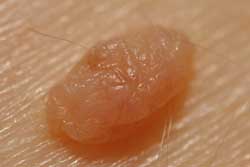
Although it is certainly a relief for anyone who has a skin tag to learn they are not cancerous and will not cause an immediate health problem, it is also true that some skin tags are not skin tags at all, but other kinds of growths that can be hazardous. For this reason, women should have their skin tags examined by a doctor or dermatologist to ensure they are harmless.
Natural Therapies
Are There Further Treatment Options?

Skin tags themselves cannot be prevented or treated, aside from being removed, but women can control their Polycystic Ovarian Syndrome (PCOS) and, in doing so, manage many of their symptoms. Although there is no pill or medical therapy that exists to treat PCOS, women are encouraged to live a healthy, well-balanced lifestyle that has been proven to help manage it.
- Follow a healthy diet. Eating foods low in sugars and carbohydrates and high in fiber is a great start to building a healthy meal plan. Additionally, women who have Polycystic Ovarian Syndrome (PCOS) should strive to avoid simple carbohydrates and only eat complex carbohydrates that are low on the glycemic index.
- Get regular exercise. Being active is important because it helps women lose weight, improves their cholesterol levels, and influences an overall higher level of health. Of course, women who have Polycystic Ovarian Syndrome (PCOS) can experience certain physical limitations. This should be seen as a challenge, not an obstacle, and women should push themselves to achieve a higher degree of physical fitness without harming themselves.
- Use nutritional supplements that are targeted blends of vitamins, minerals, and botanicals.
- Seek out support. Having someone to turn to is one thing, but having a friend who has been through the exact same experience is another. In addition to opening up to friends and family, women should join support groups that will allow them to connect with other women who have been through the same challenges.
These four elements, along with the fifth element of learning about PCOS, its symptoms, and its primary underlying cause of Insulin Resistance, comprise the five key elements of the Insulite PCOS System.
Can Skin Tags Be Removed?
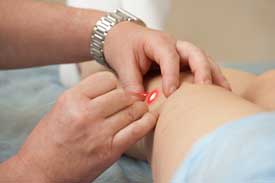 Skin tags are not cancerous or dangerous in other ways, but they can certainly be inconvenient. Women often opt to have their skin tags removed due to the fact they are uncomfortable or unsightly. The removal of a skin tag is a simple process, one that can be performed in the doctor’s or dermatologist’s office. Traditional, removal methods include freezing, cautery, and surgical removal. Regardless of whether or not women decide to have their skin tags cut, frozen, or burned off, they must be sure to have the procedure carried out by a professional. All too often individuals try to remove their skin tags on their own, which can be painful and result in infection, skin discoloration, and unattractive scarring.
Skin tags are not cancerous or dangerous in other ways, but they can certainly be inconvenient. Women often opt to have their skin tags removed due to the fact they are uncomfortable or unsightly. The removal of a skin tag is a simple process, one that can be performed in the doctor’s or dermatologist’s office. Traditional, removal methods include freezing, cautery, and surgical removal. Regardless of whether or not women decide to have their skin tags cut, frozen, or burned off, they must be sure to have the procedure carried out by a professional. All too often individuals try to remove their skin tags on their own, which can be painful and result in infection, skin discoloration, and unattractive scarring.
Next Steps
- Take the PCOS Quiz! Get your score and assess your hormone health risks.
- Join our Facebook Sisterhood Group Pose your questions to this group of like-minded women. Get the answers to your questions and the support you need.
- Checkout the Hormone Reset. Guided Practices to eliminate anxiety, lose weight and boost energy.
We are committed to helping women reverse their symptoms of hormone imbalance – a major cause of excess weight gain, adult acne, unwanted facial hair, depression, anxiety, and heartbreaking female infertility.
©Insulite Health empowers women with hormone imbalance to transform their lives through a process of healing with the Natural Hormone Solution –a complete solution for helping women reverse the symptoms hormone imbalance..

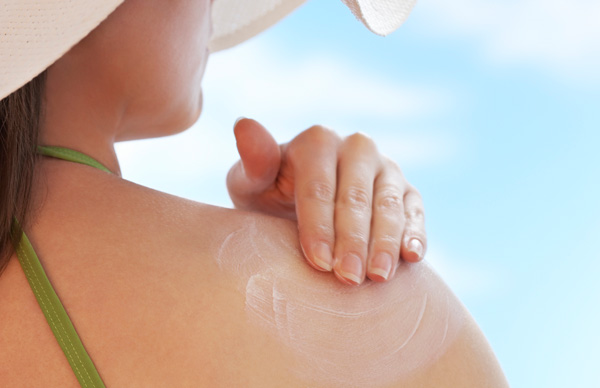
 Infertility:? Affecting approximately 5-10 percent of women of childbearing age, Polycystic Ovarian Syndrome (PCOS) is a leading cause of female infertility and has deprived millions of women of the opportunity to conceive, carry, and deliver their own children.
Infertility:? Affecting approximately 5-10 percent of women of childbearing age, Polycystic Ovarian Syndrome (PCOS) is a leading cause of female infertility and has deprived millions of women of the opportunity to conceive, carry, and deliver their own children.